人教版(2019)选择性必修第二册Unit 2 Bridging Cultures Discover useful structures 名词性从句课件(共31张PPT)
文档属性
| 名称 | 人教版(2019)选择性必修第二册Unit 2 Bridging Cultures Discover useful structures 名词性从句课件(共31张PPT) |  | |
| 格式 | pptx | ||
| 文件大小 | 11.8MB | ||
| 资源类型 | 教案 | ||
| 版本资源 | 人教版(2019) | ||
| 科目 | 英语 | ||
| 更新时间 | 2024-04-03 21:36:54 | ||
图片预览

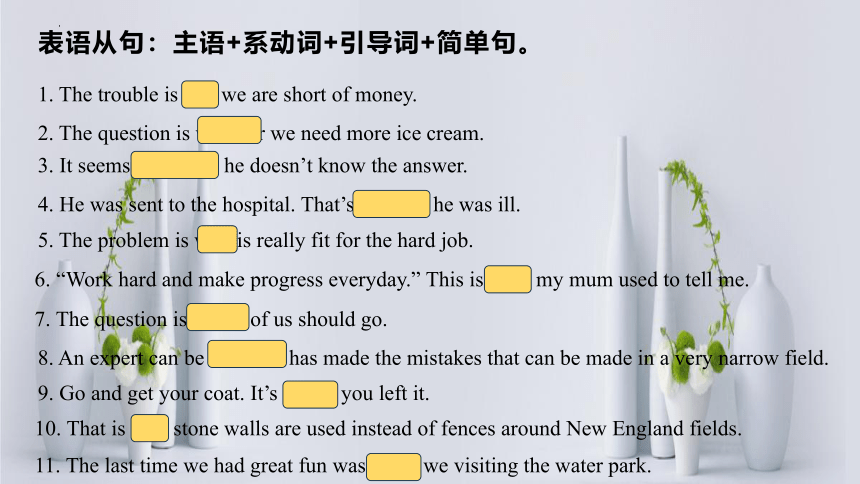
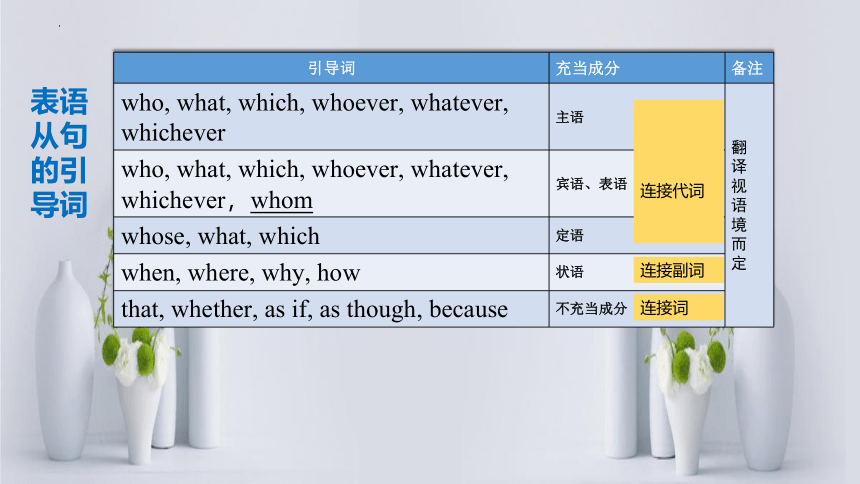
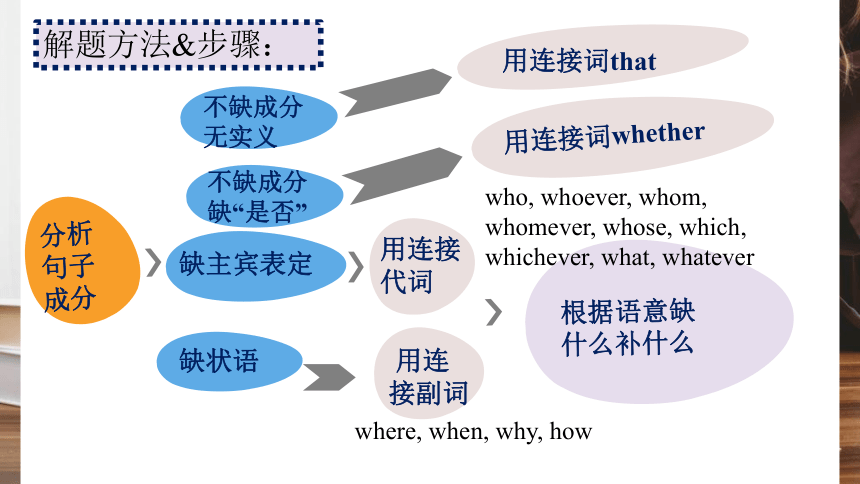
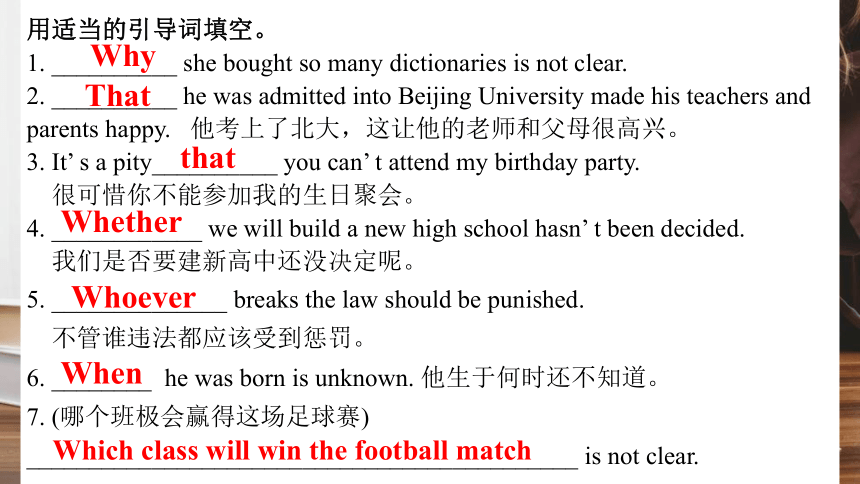
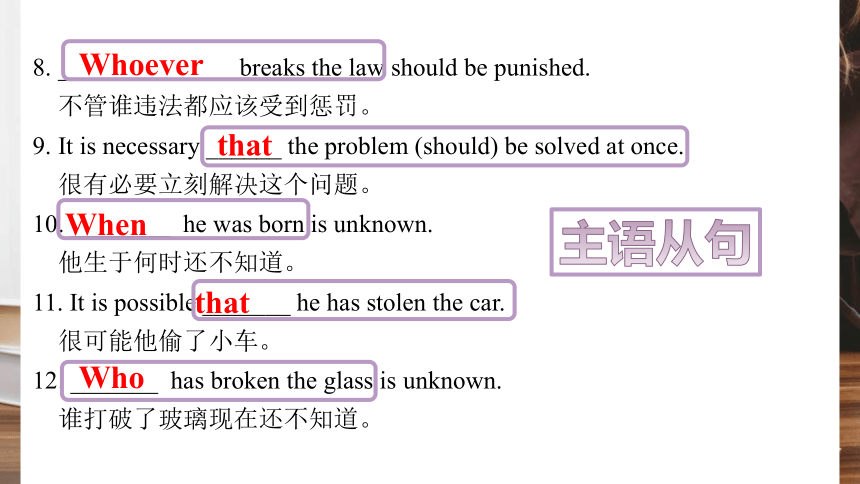
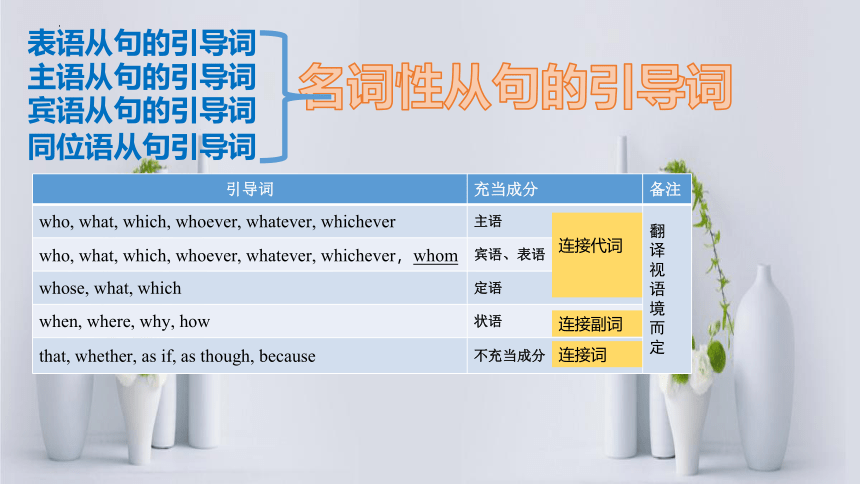
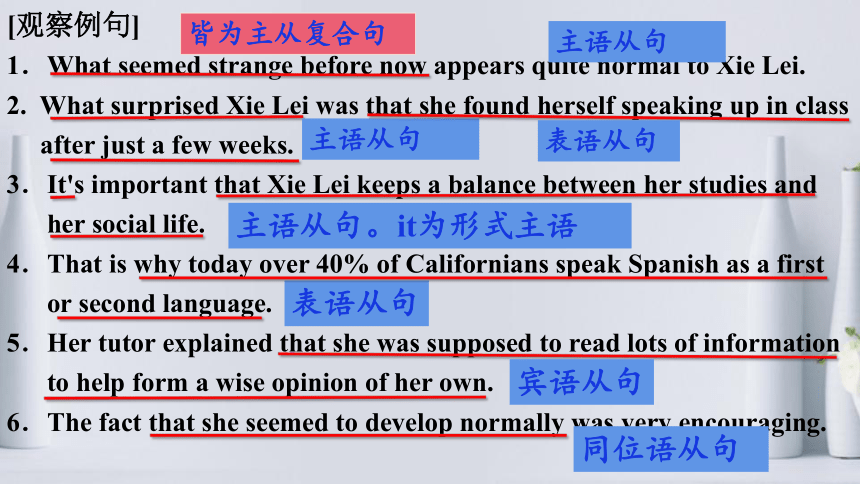

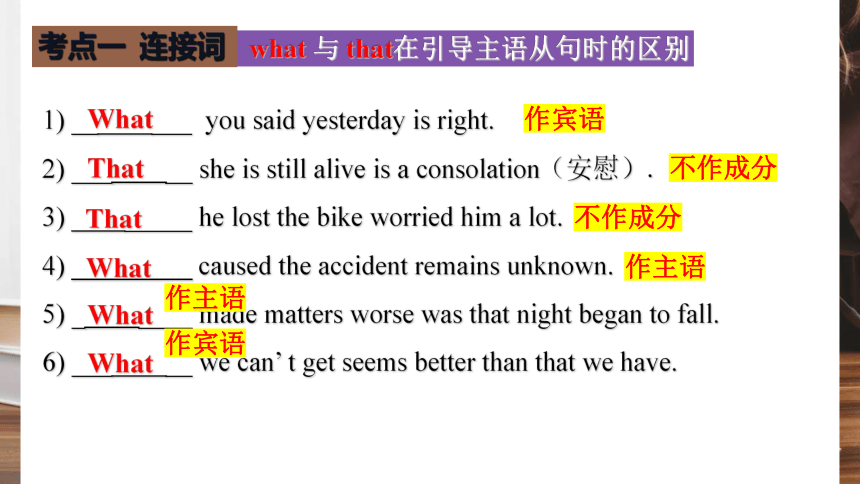


文档简介
(共31张PPT)
U2 Bridging Cultures
名词性从句
表语从句:主语+系动词+引导词+简单句。
1. The trouble is that we are short of money.
2. The question is whether we need more ice cream.
3. It seems as though he doesn’t know the answer.
4. He was sent to the hospital. That’s because he was ill.
5. The problem is who is really fit for the hard job.
6. “Work hard and make progress everyday.” This is what my mum used to tell me.
7. The question is which of us should go.
8. An expert can be whoever has made the mistakes that can be made in a very narrow field.
9. Go and get your coat. It’s where you left it.
10. That is why stone walls are used instead of fences around New England fields.
11. The last time we had great fun was when we visiting the water park.
引导词 充当成分 备注
who, what, which, whoever, whatever, whichever 主语 翻
译
视
语
境
而
定
who, what, which, whoever, whatever, whichever,whom 宾语、表语
whose, what, which 定语
when, where, why, how 状语
that, whether, as if, as though, because 不充当成分
连接词
连接副词
连接代词
表语从句的引导词
分析句子成分
缺主宾表定
缺状语
用连接代词
用连接副词
根据语意缺什么补什么
不缺成分
缺“是否”
不缺成分
无实义
用连接词that
用连接词whether
解题方法&步骤:
who, whoever, whom, whomever, whose, which, whichever, what, whatever
where, when, why, how
用适当的引导词填空。
1. __________ she bought so many dictionaries is not clear.
2. __________ he was admitted into Beijing University made his teachers and parents happy. 他考上了北大,这让他的老师和父母很高兴。
3. It’ s a pity__________ you can’ t attend my birthday party.
很可惜你不能参加我的生日聚会。
4. ____________ we will build a new high school hasn’ t been decided.
我们是否要建新高中还没决定呢。
5. ______________ breaks the law should be punished.
不管谁违法都应该受到惩罚。
6. ________ he was born is unknown. 他生于何时还不知道。
7. (哪个班极会赢得这场足球赛)
____________________________________________ is not clear.
Why
That
that
Whether
Whoever
When
Which class will win the football match
8. ______________ breaks the law should be punished.
不管谁违法都应该受到惩罚。
9. It is necessary ______ the problem (should) be solved at once.
很有必要立刻解决这个问题。
10. ________ he was born is unknown.
他生于何时还不知道。
11. It is possible _______ he has stolen the car.
很可能他偷了小车。
12. _______ has broken the glass is unknown.
谁打破了玻璃现在还不知道。
Whoever
that
When
that
Who
主语从句
引导词 充当成分 备注
who, what, which, whoever, whatever, whichever 主语 翻
译
视
语
境
而
定
who, what, which, whoever, whatever, whichever,whom 宾语、表语
whose, what, which 定语
when, where, why, how 状语
that, whether, as if, as though, because 不充当成分
连接词
连接副词
连接代词
表语从句的引导词
主语从句的引导词
宾语从句的引导词
同位语从句引导词
名词性从句的引导词
[观察例句]
1.What seemed strange before now appears quite normal to Xie Lei.
2. What surprised Xie Lei was that she found herself speaking up in class
after just a few weeks.
3.It's important that Xie Lei keeps a balance between her studies and
her social life.
4.That is why today over 40% of Californians speak Spanish as a first
or second language.
5.Her tutor explained that she was supposed to read lots of information
to help form a wise opinion of her own.
6.The fact that she seemed to develop normally was very encouraging.
皆为主从复合句
主语从句
主语从句。it为形式主语
表语从句
主语从句
表语从句
宾语从句
同位语从句
名词性从句几个常考考点
1) _________ you said yesterday is right.
2) _________ she is still alive is a consolation(安慰).
3) _________ he lost the bike worried him a lot.
4) _________ caused the accident remains unknown.
5) _________ made matters worse was that night began to fall.
6) _________ we can’ t get seems better than that we have.
That
注: what 与 that在引导主语从句时的区别
What
What
That
What
What
作宾语
不作成分
不作成分
作主语
作主语
作宾语
考点一 连接词
that 和what 的选用
that 和 what 都可引导所有的名词性从句。但是,______除起连接作用外,还在名词性从句中充当成分,可作从句的_______、_____、_____、或______。而_____在名词性从句中不充当任何成分,只起_______作用。what表示泛指的事物,常译为"什么"或"所……的事物",在含义上等于“名词+that”
what
主语
宾语
表语
that
连接
总结归纳:
定语
1.他犯了那样一个错误真是遗憾。
___________________________ is a pity .
2.他来不来不重要。
________________________doesn’t matter.
It doesn’t matter whether…
That he made such a mistake
It is a pity that…
考点 2 :it作形式主语,形式宾语
it 作形式主语
Whether he will come or not
it作形式主语,主语从句后移
有时为了使句子结构平衡,避免“头重脚轻”,常用it作形式主语,而把主语从句,即真正的主语,放在后面。
主语从句与形式主语it
基本句型结构 常用词语
It is+名词+that从句 常用的名词有a fact,a shame,a pity,no wonder等。
It is+形容词+that从句 常用的形容词有necessary,strange,important,possible等。当形容词为important,necessary等时,主语从句的谓语用“(should+)动词原形”。
It is+过去分词+that从句 常用的过去分词有said,reported,decided,believed,suggested,ordered等。过去分词为suggested,ordered等表“建议,命令”的词时,主语从句的谓语用“(should+)动词原形”。
It+动词(短语)+that从句 常用的动词(短语)有seem,happen,turn out,occur to等。
It is a pity that she has made such a mistake.
她犯了这样一个错误,真是遗憾。
It is very important that a student (should) learn English well.学生学好英语很重要。
it 作形式宾语
it作形式宾语句型:
主语 + vt.(find/ feel/ think/ consider/ make/ believe) + it + 宾补(形容词和名词)+ that/ wh- …;
1. We find _______ necessary that we practise spoken English every day.
2. I have made _______ a rule that I keep a diary every day.
it
it
考点3 同位语从句和定语从句的区别
1.The suggestion that he should not go there is of great value.
2. The suggestion that he made is of great value.
3.The fact that he won the first place can’t be denied.
4.The fact that he mentioned excited me.
同位语从句
同位语从句
定语从句
定语从句
同位语从句一般跟在名词fact, news, promise, truth, belief, thought, idea, answer, information, knowledge, doubt, hope, law, opinion, plan, suggestion,message,chance, conclusion, decision,后面, 用以说明或解释前面的名词的内容.
连接词通常为that,但在从句中不作任何成分,只起连接作用,但不能被省略,
定语从句:对先行词起修饰限制作用,并且关系代词that在句中常作句子的主语,宾语
◆同位语从句通常由that引导,但what, why, whether, when, where, how等有时也可引导同位语从句。如:
I have no idea when she will be back.
It is very difficult to answer your question how I did it.
◆同位语从句有时不直接跟在被修饰的名词后面,而是被其它成分隔开了。如:
We’ve just heard a warning on the radio that a typhoon may be on its way.
1. I asked her ______________ she had a bike.
2. ____________ we will hold a party in the open air
tomorrow depends on the weather.
3. We're worried about ____________ he is safe.
4. I don't know _________________ he will come.
5. I don't know ____________ or not he is well.
6. The question is ____________ he should do it.
7. The doctor can hardly answer the question ________
the old man will recover soon.
8. I don't know ___________ to go.
if / whether
Whether
whether
whether / if
whether
whether
whether
whether
考点4. Whether和 if 的区别
介词后的宾语从句
引导主语从句
与or not 连用
同位语从句
不定式前
表语从句
只用whether,不用if的情况
“缺什么补什么”原则
缺主语,指人用____,指物用_____
缺宾语,指人用______ _,指物用____
缺时间状语用______;
地点状语用______;
原因状语用_____;
方式状语用_____;
定语用____________;
什么都不缺用_______,缺“是否”_______
who
what
who/whom
what
when
where
why
how
which/whose
名词性从句的连接词
that
whether
用适当的引导词完成下面练习。
1. _________ he has is an empty room.
2. _________ he has come back is known to all.
3. He didn’t tell me ________ he went yesterday.
4. _____________ he will go to France has not been decided yet.
5. No one knows _________ will be the next president.
6. The shy girl asked _____________ she could have a look at the present.
7. He expressed his wish to me _________ he could go to Canada to study.
What
That
where
Whether/When
who
whether/if
that
主语从句,what作has的宾语
主语从句,that不作成分
宾语从句,where作状语
主语从句,whether表是否, when作状语
宾语从句,who作主语
宾语从句,whether/if表是否
同位语从句,that不作成分
Combine each pair of sentences using the words in brackets.
1. The advisor talked about maintaining reasonable expectations (期望,预期) when studying abroad. His words were quite helpful to May. (what)
What the advisor talked about maintaining reasonable expectations when studying abroad was quite helpful to May.
谈论…
talk sth vt.说了...
合并2个句子成一个句子的方法/步骤:
①找共同;
②确定主句;
③确定从句的位置;
④用什么连词。
2. Students have to write countless research papers as part of their coursework. This was not something that Chen Hao was ready for. (that)
That students have to write countless research papers as part of their coursework was not something that Chen Hao was ready for.
adj.无数的,数不尽的
研究论文
n. 作业
3. Who will be the successful applicant (申请人) for the summer job at the law firm (事务所) This is the question. (who)
Who will be the successful applicant for the summer job at the law firm is the question.
The question is who will be the successful applicant for the summer job at the law firm.
在律师事务所
4. Exposure (接触、体验) to another culture and its people can give exchange students great insights (洞察力、眼光) into the world. This is an advantage of studying abroad. (that)
That exposure to another culture and its people can give exchange students great insights into the world is an advantage of studying abroad.
An advantage of studying abroad is that exposure to another culture and its people can give exchange students great insights into the world.
对世界的洞察力
5. Schools in the States are quite multicultural, with students and teachers from many different ethnic backgrounds. This impressed Liu Yang( It … that)
It impressed Liu Yang that schools in the States are quite multicultural, with students and teachers from many different ethnic backgrounds
6. Should she, stick to her own way of life or follow the American way This is her confusion. (whether)
Whether she should stick to her own way of life or follow the American way is her confusion.
Complete the passage with A – D from the box. What other things do you think might attract international students to China
A that he enjoys being with Chinese people
B How he can learn to appreciate it more deeply
C What impressed him first
D that people can eat almost everything with chopsticks
喜欢和…待在一起
n.筷子
吸引…到…
After just a few months in China, Leon, an exchange student from Germany, says that he has fallen in love with Chinese culture. ______ was the Chinese food. He couldn’t believe how many different kinds of Chinese food there are! Something else he found impressive was ______. Then there’s China’s colourful culture, from art to music, and from calligraphy to literature.
C
C What impressed him first
逻辑纽带
多彩的文化
n.书法
D
D that people can eat almost everything with chopsticks
______ remains an important goal for him, as he is truly fascinated by it. Leon is also amazed by the convenience of cashless payments in China. He can go outside without any need for cash — all he needs is his mobile phone! The biggest reason why he loves China, however, is ______. He has made great friends here — friends that he will still remember long after his departure (离开).
B
A
B How he can learn to appreciate it more deeply
A that he enjoys being with Chinese people
被…吸引
对…感到惊讶
出门无需带现金
手机
在他离开很久之后
出门无需带现金
Work in pairs and take turns to talk about Xie Lei’s experience by completing the following sentences with your own words.
1 That ... made Xie Lei confused at first.
2 It surprised Xie Lei that ...
3 What Xie Lei’s tutor wanted to say was that …
4 The motivation for Xie Lei to study abroad was that …
轮流做…
某人做…的动机/目的是…
Thank you for your listening!
U2 Bridging Cultures
名词性从句
表语从句:主语+系动词+引导词+简单句。
1. The trouble is that we are short of money.
2. The question is whether we need more ice cream.
3. It seems as though he doesn’t know the answer.
4. He was sent to the hospital. That’s because he was ill.
5. The problem is who is really fit for the hard job.
6. “Work hard and make progress everyday.” This is what my mum used to tell me.
7. The question is which of us should go.
8. An expert can be whoever has made the mistakes that can be made in a very narrow field.
9. Go and get your coat. It’s where you left it.
10. That is why stone walls are used instead of fences around New England fields.
11. The last time we had great fun was when we visiting the water park.
引导词 充当成分 备注
who, what, which, whoever, whatever, whichever 主语 翻
译
视
语
境
而
定
who, what, which, whoever, whatever, whichever,whom 宾语、表语
whose, what, which 定语
when, where, why, how 状语
that, whether, as if, as though, because 不充当成分
连接词
连接副词
连接代词
表语从句的引导词
分析句子成分
缺主宾表定
缺状语
用连接代词
用连接副词
根据语意缺什么补什么
不缺成分
缺“是否”
不缺成分
无实义
用连接词that
用连接词whether
解题方法&步骤:
who, whoever, whom, whomever, whose, which, whichever, what, whatever
where, when, why, how
用适当的引导词填空。
1. __________ she bought so many dictionaries is not clear.
2. __________ he was admitted into Beijing University made his teachers and parents happy. 他考上了北大,这让他的老师和父母很高兴。
3. It’ s a pity__________ you can’ t attend my birthday party.
很可惜你不能参加我的生日聚会。
4. ____________ we will build a new high school hasn’ t been decided.
我们是否要建新高中还没决定呢。
5. ______________ breaks the law should be punished.
不管谁违法都应该受到惩罚。
6. ________ he was born is unknown. 他生于何时还不知道。
7. (哪个班极会赢得这场足球赛)
____________________________________________ is not clear.
Why
That
that
Whether
Whoever
When
Which class will win the football match
8. ______________ breaks the law should be punished.
不管谁违法都应该受到惩罚。
9. It is necessary ______ the problem (should) be solved at once.
很有必要立刻解决这个问题。
10. ________ he was born is unknown.
他生于何时还不知道。
11. It is possible _______ he has stolen the car.
很可能他偷了小车。
12. _______ has broken the glass is unknown.
谁打破了玻璃现在还不知道。
Whoever
that
When
that
Who
主语从句
引导词 充当成分 备注
who, what, which, whoever, whatever, whichever 主语 翻
译
视
语
境
而
定
who, what, which, whoever, whatever, whichever,whom 宾语、表语
whose, what, which 定语
when, where, why, how 状语
that, whether, as if, as though, because 不充当成分
连接词
连接副词
连接代词
表语从句的引导词
主语从句的引导词
宾语从句的引导词
同位语从句引导词
名词性从句的引导词
[观察例句]
1.What seemed strange before now appears quite normal to Xie Lei.
2. What surprised Xie Lei was that she found herself speaking up in class
after just a few weeks.
3.It's important that Xie Lei keeps a balance between her studies and
her social life.
4.That is why today over 40% of Californians speak Spanish as a first
or second language.
5.Her tutor explained that she was supposed to read lots of information
to help form a wise opinion of her own.
6.The fact that she seemed to develop normally was very encouraging.
皆为主从复合句
主语从句
主语从句。it为形式主语
表语从句
主语从句
表语从句
宾语从句
同位语从句
名词性从句几个常考考点
1) _________ you said yesterday is right.
2) _________ she is still alive is a consolation(安慰).
3) _________ he lost the bike worried him a lot.
4) _________ caused the accident remains unknown.
5) _________ made matters worse was that night began to fall.
6) _________ we can’ t get seems better than that we have.
That
注: what 与 that在引导主语从句时的区别
What
What
That
What
What
作宾语
不作成分
不作成分
作主语
作主语
作宾语
考点一 连接词
that 和what 的选用
that 和 what 都可引导所有的名词性从句。但是,______除起连接作用外,还在名词性从句中充当成分,可作从句的_______、_____、_____、或______。而_____在名词性从句中不充当任何成分,只起_______作用。what表示泛指的事物,常译为"什么"或"所……的事物",在含义上等于“名词+that”
what
主语
宾语
表语
that
连接
总结归纳:
定语
1.他犯了那样一个错误真是遗憾。
___________________________ is a pity .
2.他来不来不重要。
________________________doesn’t matter.
It doesn’t matter whether…
That he made such a mistake
It is a pity that…
考点 2 :it作形式主语,形式宾语
it 作形式主语
Whether he will come or not
it作形式主语,主语从句后移
有时为了使句子结构平衡,避免“头重脚轻”,常用it作形式主语,而把主语从句,即真正的主语,放在后面。
主语从句与形式主语it
基本句型结构 常用词语
It is+名词+that从句 常用的名词有a fact,a shame,a pity,no wonder等。
It is+形容词+that从句 常用的形容词有necessary,strange,important,possible等。当形容词为important,necessary等时,主语从句的谓语用“(should+)动词原形”。
It is+过去分词+that从句 常用的过去分词有said,reported,decided,believed,suggested,ordered等。过去分词为suggested,ordered等表“建议,命令”的词时,主语从句的谓语用“(should+)动词原形”。
It+动词(短语)+that从句 常用的动词(短语)有seem,happen,turn out,occur to等。
It is a pity that she has made such a mistake.
她犯了这样一个错误,真是遗憾。
It is very important that a student (should) learn English well.学生学好英语很重要。
it 作形式宾语
it作形式宾语句型:
主语 + vt.(find/ feel/ think/ consider/ make/ believe) + it + 宾补(形容词和名词)+ that/ wh- …;
1. We find _______ necessary that we practise spoken English every day.
2. I have made _______ a rule that I keep a diary every day.
it
it
考点3 同位语从句和定语从句的区别
1.The suggestion that he should not go there is of great value.
2. The suggestion that he made is of great value.
3.The fact that he won the first place can’t be denied.
4.The fact that he mentioned excited me.
同位语从句
同位语从句
定语从句
定语从句
同位语从句一般跟在名词fact, news, promise, truth, belief, thought, idea, answer, information, knowledge, doubt, hope, law, opinion, plan, suggestion,message,chance, conclusion, decision,后面, 用以说明或解释前面的名词的内容.
连接词通常为that,但在从句中不作任何成分,只起连接作用,但不能被省略,
定语从句:对先行词起修饰限制作用,并且关系代词that在句中常作句子的主语,宾语
◆同位语从句通常由that引导,但what, why, whether, when, where, how等有时也可引导同位语从句。如:
I have no idea when she will be back.
It is very difficult to answer your question how I did it.
◆同位语从句有时不直接跟在被修饰的名词后面,而是被其它成分隔开了。如:
We’ve just heard a warning on the radio that a typhoon may be on its way.
1. I asked her ______________ she had a bike.
2. ____________ we will hold a party in the open air
tomorrow depends on the weather.
3. We're worried about ____________ he is safe.
4. I don't know _________________ he will come.
5. I don't know ____________ or not he is well.
6. The question is ____________ he should do it.
7. The doctor can hardly answer the question ________
the old man will recover soon.
8. I don't know ___________ to go.
if / whether
Whether
whether
whether / if
whether
whether
whether
whether
考点4. Whether和 if 的区别
介词后的宾语从句
引导主语从句
与or not 连用
同位语从句
不定式前
表语从句
只用whether,不用if的情况
“缺什么补什么”原则
缺主语,指人用____,指物用_____
缺宾语,指人用______ _,指物用____
缺时间状语用______;
地点状语用______;
原因状语用_____;
方式状语用_____;
定语用____________;
什么都不缺用_______,缺“是否”_______
who
what
who/whom
what
when
where
why
how
which/whose
名词性从句的连接词
that
whether
用适当的引导词完成下面练习。
1. _________ he has is an empty room.
2. _________ he has come back is known to all.
3. He didn’t tell me ________ he went yesterday.
4. _____________ he will go to France has not been decided yet.
5. No one knows _________ will be the next president.
6. The shy girl asked _____________ she could have a look at the present.
7. He expressed his wish to me _________ he could go to Canada to study.
What
That
where
Whether/When
who
whether/if
that
主语从句,what作has的宾语
主语从句,that不作成分
宾语从句,where作状语
主语从句,whether表是否, when作状语
宾语从句,who作主语
宾语从句,whether/if表是否
同位语从句,that不作成分
Combine each pair of sentences using the words in brackets.
1. The advisor talked about maintaining reasonable expectations (期望,预期) when studying abroad. His words were quite helpful to May. (what)
What the advisor talked about maintaining reasonable expectations when studying abroad was quite helpful to May.
谈论…
talk sth vt.说了...
合并2个句子成一个句子的方法/步骤:
①找共同;
②确定主句;
③确定从句的位置;
④用什么连词。
2. Students have to write countless research papers as part of their coursework. This was not something that Chen Hao was ready for. (that)
That students have to write countless research papers as part of their coursework was not something that Chen Hao was ready for.
adj.无数的,数不尽的
研究论文
n. 作业
3. Who will be the successful applicant (申请人) for the summer job at the law firm (事务所) This is the question. (who)
Who will be the successful applicant for the summer job at the law firm is the question.
The question is who will be the successful applicant for the summer job at the law firm.
在律师事务所
4. Exposure (接触、体验) to another culture and its people can give exchange students great insights (洞察力、眼光) into the world. This is an advantage of studying abroad. (that)
That exposure to another culture and its people can give exchange students great insights into the world is an advantage of studying abroad.
An advantage of studying abroad is that exposure to another culture and its people can give exchange students great insights into the world.
对世界的洞察力
5. Schools in the States are quite multicultural, with students and teachers from many different ethnic backgrounds. This impressed Liu Yang( It … that)
It impressed Liu Yang that schools in the States are quite multicultural, with students and teachers from many different ethnic backgrounds
6. Should she, stick to her own way of life or follow the American way This is her confusion. (whether)
Whether she should stick to her own way of life or follow the American way is her confusion.
Complete the passage with A – D from the box. What other things do you think might attract international students to China
A that he enjoys being with Chinese people
B How he can learn to appreciate it more deeply
C What impressed him first
D that people can eat almost everything with chopsticks
喜欢和…待在一起
n.筷子
吸引…到…
After just a few months in China, Leon, an exchange student from Germany, says that he has fallen in love with Chinese culture. ______ was the Chinese food. He couldn’t believe how many different kinds of Chinese food there are! Something else he found impressive was ______. Then there’s China’s colourful culture, from art to music, and from calligraphy to literature.
C
C What impressed him first
逻辑纽带
多彩的文化
n.书法
D
D that people can eat almost everything with chopsticks
______ remains an important goal for him, as he is truly fascinated by it. Leon is also amazed by the convenience of cashless payments in China. He can go outside without any need for cash — all he needs is his mobile phone! The biggest reason why he loves China, however, is ______. He has made great friends here — friends that he will still remember long after his departure (离开).
B
A
B How he can learn to appreciate it more deeply
A that he enjoys being with Chinese people
被…吸引
对…感到惊讶
出门无需带现金
手机
在他离开很久之后
出门无需带现金
Work in pairs and take turns to talk about Xie Lei’s experience by completing the following sentences with your own words.
1 That ... made Xie Lei confused at first.
2 It surprised Xie Lei that ...
3 What Xie Lei’s tutor wanted to say was that …
4 The motivation for Xie Lei to study abroad was that …
轮流做…
某人做…的动机/目的是…
Thank you for your listening!
